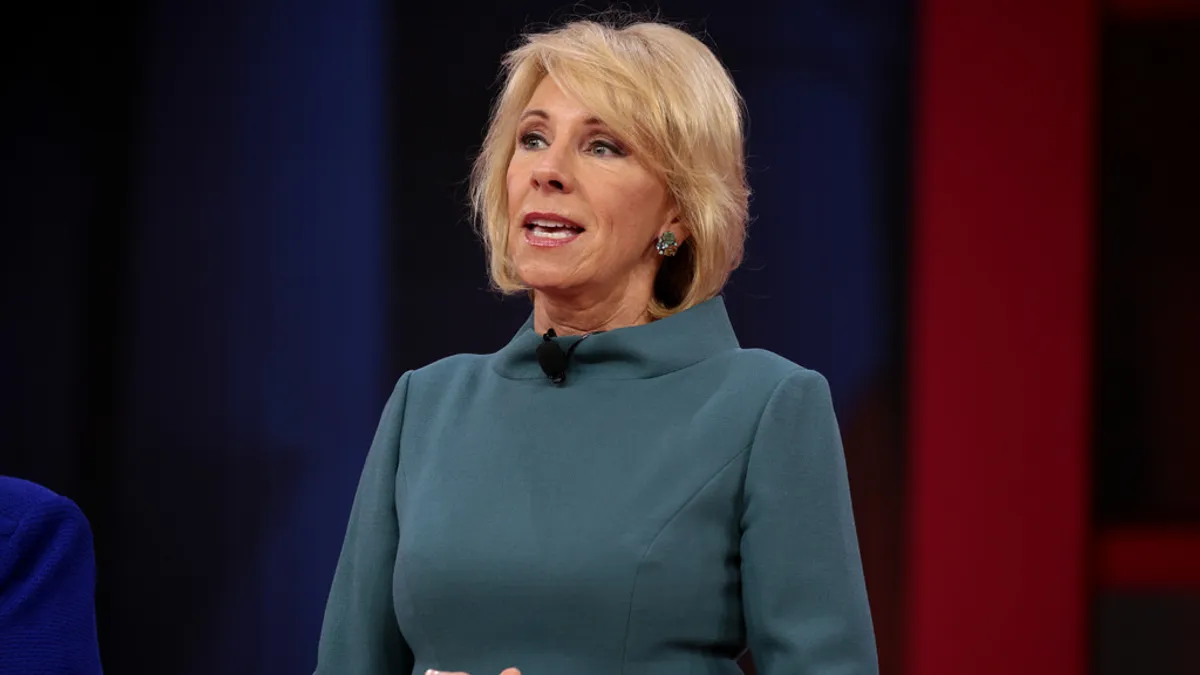On Monday, U.S. Secretary of Education Betsy DeVos joined hundreds of attendees at the Education Writers Association's (EWA) 72nd National Seminar in Baltimore. During her on-stage interview with education reporter Erica Green, of The New York Times, DeVos discussed several major topics in K-12 education, including teacher activism, her federal school safety commission and Education Freedom Scholarships (EFS), her latest school choice proposal.
Below are the main takeaways from her appearance:
Getting support for Education Freedom Scholarships
After unveiling the EFS proposal in February, DeVos has continued to push for the initiative, under which taxpayers can choose to contribute in exchange for dollar-for-dollar federal tax credits — meant to foster choice — that are capped at $5 billion annually. These credits would be for private donations to scholarship-granting organizations, and states could use the funds for dual enrollment, private schools, home schooling and more.
Last month, DeVos called the proposal "critical" but noted that she and supporting lawmakers, mainly Republicans, "need to continue making allies" for its companion legislation to pass in Congress. On Monday, she said she is reaching out to Democrats but acknowledged that "bringing support onboard for this initiative is going to take time."
"We didn't get where we are overnight, and we know that change for many people is hard," she said. "This is something that Congress ultimately has to embrace or not ... but I will continue to advocate and argue for the fact that we need to do something different for students."
Teachers on strike
In discussing nationwide teacher activism — in which educators have demanded better pay and working conditions — DeVos took a hard-line stance on the strikes or walkouts.
"I think it's important that adults have adult disagreements on adult time and not ultimately hurt kids in the process, and I think too often they're doing so by walking out of classrooms and having their arguments in the way that they are," she said.
However, she agreed that teachers should be paid more, and that "teaching as a profession should be a highly honored and respected profession."
Teachers should get PD vouchers
President Donald Trump's proposed Fiscal Year 2020 budget moved to slash the $2.1 billion Title II grant program, which funds educators' professional development (PD). At the same time, the proposal also includes stipends for teachers to choose their PD.
When asked about the program and its importance, DeVos said she repeatedly heard from frustrated educators who want better PD opportunities, adding that there needs to be options for different groups, such as new teachers versus veteran ones.
She added that for "teachers who are really excellent at what they do and want to continue to develop professionally themselves — often the only option that they have is to go into administration and leave the classroom — the thing that they're best at doing," she said. "That's a tragedy for everyone, because the students don't ultimately benefit and the teachers themselves really wish that they had that opportunity to be with students again."
Obama-era guidance was an 'overreach'
The final report and recommendations of the Federal Commission on School Safety — chaired by DeVos and formed in the aftermath of the Parkland, Florida, school shooting in February 2018 — suggested rescinding the Obama-era guidance aimed at eliminating racial disparities in school discipline.
DeVos said the guidance — which notified districts that they could be violating federal civil rights law if racial bias was occurring within school discipline — was an "overreach by the previous administration," adding that "those who were opposed viewed it very much as a mandate that was hamstringing them in many ways, and was in many ways making their schools less safe."
The Trump administration in 2017 scrapped Obama-era guidance on bathrooms for transgender students. And in July 2018, it said it was withdrawing several Obama-era guidance documents designed to help schools take race into account in increasing campus diversity. Green asked DeVos about the department's goals when taking these types of actions.
"We, at the department, are very committed to ensuring all students' civil rights are protected. I'm also committed to following the law," she said, adding that the guidance documents were merely "protections on paper" and not actual protections. "I am not going to overstep and make law where there isn't law."
In addition, while the commission formed after the Marjory Stoneman Douglas High School shooting — and in the wake of many calling for tighter gun laws — the group didn't focus much attention toward gun policies. During her EWA appearance, DeVos told the audience: "The commission was established to study school safety. It was in the aftermath of the Parkland tragedy, but it wasn't a focus on Parkland. It was really to talk about ways that educators and communities should and may consider how to make sure that students are safe when they go to school."






















